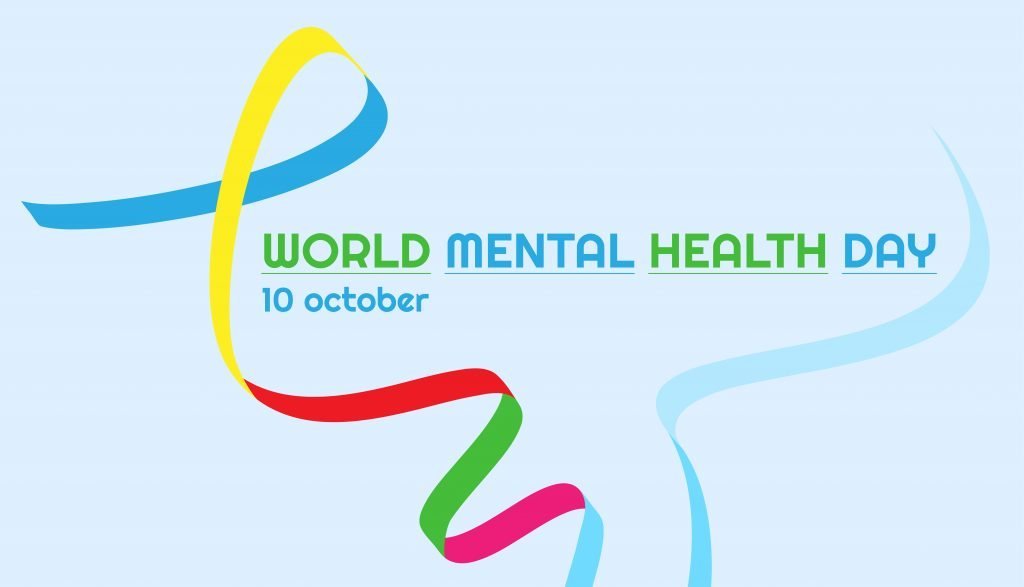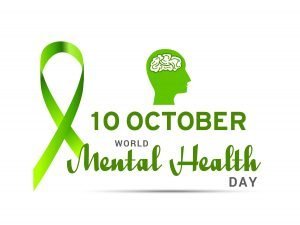Every year on October 10, The World Health Organization (WHO) celebrates World Mental Health Day. World Mental Health Day highlight issues of global mental health education, awareness and advocacy against the social stigma of mental health illnesses. The goal is to help raise mental health awareness, as well as show that we all can help to ensure that people dealing with problems concerning mental health can live better lives with dignity.
Our elderly loved ones are not excluded from mental illness; in fact, according to a recent CDC report, over 20% of adults ages 55 or older have had a mental health concern, but only about two out of three received treatment. While mental illness in the elderly is often overlooked and challenging to diagnose, its effects can greatly diminish a senior’s health and well-being.
Talking About Mental Health
The Centers for Disease Control and Prevention (CDC) recognize depression as a public health issue. In fact, mental illness is a leading cause of both injury and disease for people around the world. By 2020, the CDC estimates that depression will be the second most common cause of disability in the world, following only heart disease.
Depression means much more than simply feeling sad or irritable. For public health professionals, one of the biggest challenges related to depression is providing access to services. Mental illness is also the focus of the World Health Organization’s (WHO’s) 2018 World Health Day, which is designed to prompt action and advocacy around an important public health topic. The WHO aims to remove the stigma from depression and encourage people to look for and find help, and it intends to work with public health partners to shine particular light on this illness’s effect on all generations, which includes our seniors.
Mental Health And Our Seniors
According to the WHO, approximately 15% of adults aged 60 and older have a mental health condition such as depression or anxiety. Since the world’s population of older adults over the course of the next 30 years is expected to double, it’s critical that time and resources are dedicated to creating a foundation for a healthier aging population.
However, it can often be difficult for older adults to receive the mental health care that they need. Some of the most debilitating barriers include:
- The Physical Manifestation of Symptoms: Mental health conditions in older adults are significantly unreported, undiagnosed, and untreated. For a time doctors incorrectly believed that the prevalence of anxiety decreased with age because of this discrepancy. However, the issue may lie in the fact that older adults tend to seek help for the physical symptoms of these mental health issues, rather than the emotional ones. Because they are reacting to the physical symptoms, they tend to seek help from their Primary Care Physician (PCP) rather than a mental health professional. By educating health professionals, and instituting a mental health screening or exam, doctors may be better able to diagnose a mental health condition before it becomes serious.
- The Thought Process That Negative Emotions Are “Normal” For Seniors: Older adults face different mental and physical issues than younger adults may which lead them to feeling that poor health and sadness — due to a loss of mobility, friends and loved ones — is normal for their population. Depression, anxiety, and despair are never a normal response to various life issues, even in seniors. Education for seniors and their loved ones about normal and abnormal reactions loss and loss of independence can go a long way towards helping senior’s health and wellness.
- Increasing Physical Health Concerns: The reality for many older adults is that they often face an increase of chronic disease. The link between chronic disease and depression is a common; and in fact studies show that for those who have severe chronic disease, more than 22% were found to have at least mild depression.
Risk Factors For Mental Health Issues In Older Adults
Our elderly may experience life stressors common to all people, but also stressors that are more common in later life, like a significant ongoing loss in capacities and a decline in functional ability. For example, older adults may experience reduced mobility, chronic pain, frailty or other health problems, for which they require some form of long-term care. In addition, older people are more likely to experience events such as bereavement, or a drop in socioeconomic status with retirement. All of these stressors can result in isolation, loneliness or psychological distress in older people, for which they may require long-term care.
One major problem in diagnosing and treating seniors with mental illness is that elderly individuals are more likely to report physical issues than they are psychological issues, and normal emotional and physical stresses associated with aging can lead to depression or anxiety. There are many possible triggers for mental illness in senior citizens, such as:
- Chronic pain
- Chronic disease
- Physical impairments (thyroid or adrenal disease can affect emotion, thought, or memory)
- Physical disabilities
- Loneliness
- Major life changes
- Grief
- Widowhood
- Certain medications
- Malnutrition/poor diet
- Dementia-causing illness
Dementia And Depression Among Our Elderly
When we think of mental health issues in seniors, Alzheimer’s and dementia is at the forefront of our thoughts, conversations, and research. However, there is another issue that poses one of the biggest threats to senior mental health is depression.
It is estimated that 50 million people worldwide are living with dementia, and the total number of people with dementia is projected to increase to 82 million in 2030 and 152 million in 2050. The significant social and economic issues associated with dementia can also include physical, emotional and economic pressures, which in turn can cause great stress to families and carers. Support is necessary for both people with dementia and their caretakers.
Depression can impair how our elderly function in daily life. Depression and other mental disorders will affect approximately 15% of the population over the age of sixty, a number that is expected to increase substantially as the population ages. Additionally other statistics about elderly mental health are:
- Anxiety disorders affect 3.8% of the older population.
- In people 55 and older, an estimated 20% have some type of mental health concern.
- Depression affects up to 5% of older adults, but that number increases to around 13.5% for those requiring home healthcare.
- Men ages seventy-five and older have a higher suicide rate than any other age group
Unicity Healthcare takes an individualized approach to caring for adults with Alzheimer’s or Dementia. We understand that no two clients are the same, and, as such, we develop an individualized service plan, incorporating all aspects of the person’s life and family. There are several steps to our process, and each is important in creating the Unicity Homecare approach, one that stresses personalization, dedication and quality care.
Most Common Elderly Mental Health Disorders
Some of the most common mental health illnesses experienced by older adults:
1. Depression
Depression is a type of mood disorder that ranks as the most pervasive mental health concern among older adults. If untreated, it can lead to physical and mental impairments and impede social functioning. Additionally, depression can interfere with the symptoms and treatment of other chronic health problems.
Common symptoms of depression include ongoing sadness, problems sleeping, physical pain or discomfort, or distancing themselves from activities previously enjoyed. Additionally, seniors suffering from depression generally see their doctors more frequently, take more medications, and experience longer hospital stays than their same-age peers.
Depression can typically be successfully treated in older adults. If you suspect a loved one or client is showing signs of depression, seek help immediately.
2. Anxiety Disorders
Like depression, anxiety is a very common mood disorder among the elderly. In fact, depression and anxiety often appear in tandem. Statistics from the CDC show that nearly half of older adults with anxiety also experience depression.
There are several different types of anxiety disorders, with the most common being generalized anxiety disorder and phobias. Here is a list of anxiety disorders you may observe:
Generalized Anxiety Disorder: The effects of generalized anxiety include persistent worry or fear, which can get progressively worse with time. These symptoms eventually interfere with socialization, job performance, and day-to-day activities. Seniors with anxiety tend to become more withdrawn and reclusive.
In addition to generalized anxiety disorder, seniors can be diagnosed with the following related disorders including:
- Phobia: An extreme, paralyzing fear of something that usually poses no threat, phobias can cause individuals to avoid certain things or situations due to irrational fears. Examples can include fear of social situations, flying, germs, driving, etc.
- Panic disorder: This disorder is characterized by periods of sudden, intense fear that can be accompanied by heart palpitations or pounding, rapid heartbeat, shaking, sweating, difficulty breathing, or experiencing feelings of doom.
- Social Anxiety Disorder: This social phobia causes individuals to fear being in certain social situations where they feel they might be judged, embarrassed, offensive to others, or rejected.
- Post-Traumatic Stress Disorder: PTSD is a disorder that usually manifests following a traumatic event that threatens a person’s safety or survival, greatly impacting his or her quality of life.
- Obsessive-Compulsive Disorder: Those who suffer from OCD experience uncontrollable recurring thoughts (obsessions) or rituals (compulsions). Examples of rituals include washing hands, checking if appliances are on or off, counting, or other behaviors typically done to quell obsessive thoughts (e.g. washing hands repeatedly to remove germs and avoid getting sick).
3. Bipolar Disorders
Bipolar disorders, or manic-depressive illnesses, are often marked by unusual mood shifts and are frequently misdiagnosed in senior citizens because the symptoms presented are typical with the aging process, especially related to dementia and Alzheimer’s. Bipolar disorder occurs equally among women and men in this age group. While younger people in the manic phase of bipolar disorder will show classic signs like elation and risky behavior, seniors are likely to become more agitated or irritable.
It is important to also note that the effects of certain medications and some types of illnesses show similar symptoms of bipolar disorders. Each individual should be treated by a medical professional to determine the root cause of any symptoms, as well as the best options for treatment.
4. Eating Disorders
Eating disorders like bulimia and anorexia nervosa have become increasingly prevalent among the elderly. Underlying behavioral or psychological issues that cause and exacerbate eating disorders can go undetected for quite a while, making it especially dangerous and difficult to diagnose. Because elderly individuals face many unique challenges like digestive issues, medications, or other health problems that affect appetite and eating, it’s important not to make assumptions as to whether he or she has an eating disorder. The senior’s family and care team should check to ensure they get the care needed for proper diagnosis and treatment.
Diagnosing Elderly Mental Disorders
Depressive disorders are the top mental health issue faced by seniors today, according to the Center for Elderly Suicide Prevention and Grief-Related Services, a program of the Institute on Aging in San Francisco. Subsequently, cognitive disorders (such as dementia and Alzheimer’s disease), anxiety disorders, and substance abuse disorders, are the other top health issues our seniors face.
The following are some signs that a senior may be suffering from a mental health concern, including but not limited to depression:
- Persistent sadness
- Trouble falling asleep or sleeping too much
- Decreased socialization
- Loss of interest in usual activities
- Excessive worrying
- Irritability
- Feeling worthless, helpless or hopeless
- Changes in appetite
- Crying spells
- Trouble focusing, remembering or making decisions
Care Strategies To Address Mental Health Needs In Our Seniors
The mental health of older adults can be improved through promoting mental health-specific health programs for older adults. This can involve creating living conditions and environments that allow people to lead a healthy life. Promoting mental health depends largely on strategies to ensure that older people have the necessary resources to meet their needs, such as:
- training for health professionals in providing care for older people;
- preventing and managing age-associated chronic diseases including mental, neurological and substance use disorders;
- designing sustainable policies on long-term and palliative care; and
- developing age-friendly services and settings.
- providing security and freedom;
- social support for older people and their caregivers;
- health and social programs targeted for those who live alone, or who suffer from a chronic or relapsing mental or physical illness;.
Recognition and treatment of mental, neurological and other disorders in older adults is essential. There is no medication currently available to cure dementia but much can be done to support and improve the lives of people with dementia and depression, as well as their caregivers and families:
- early diagnosis, in order to promote early and optimal management;
- optimizing physical and mental health, functional ability and well-being;
- identifying and treating accompanying physical illness;
- detecting and managing challenging behavior; and
- providing information and long-term support to caregivers.
There are a variety of treatment options for those suffering from mental health disorders, including medications, therapies, or a combination of both.
If you suspect that your loved one is struggling with a mental health issue, don’t hesitate to get in touch with the individual’s health care provider. They can direct you to a geriatric psychiatrist, psychologist, or counselor who can help.
* * * *
As part of World Mental Health Day, we can help seniors living with mental health issues like depression by continuing to raising awareness of the issue, educating the public, providing support, and reducing the stigma of mental illness. An increased awareness about the mental health issues facing older adults, and encouraging changes to senior health can make a huge difference towards improving the lives of and well-being of the world’s older adult population.
Treatment for seniors is a team effort, especially when they are unable to care for themselves. Ensure that the elderly individuals in your care are well supported by seeking help when symptoms are detected, and by providing love and emotional support to help ensure the highest quality of life possible.
When the time comes to consider home care for your loved one, you may seek help from Unicity’s qualified home care professionals to help ease the burden.
For more information please contact us at:
Email: info@unicity-ec.com
Explore Unicity Healthcare’s website: www.unicity-ec.com




